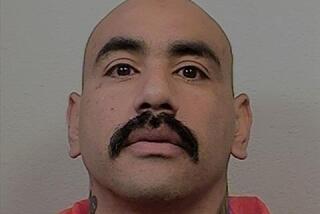Chippendale Club Owner Kills Himself : Crime: Somen Banerjee, founder of the male-stripper nightspot, is found dead in his cell. He was to be sentenced in the murder-for-hire of his former business partner.
- Share via
A Playa del Rey man who owned Chippendale’s--the male strip club--committed suicide in a Downtown jail cell early Monday morning, just hours before he was scheduled to be sentenced to a lengthy prison term for the murder-for-hire of his former business partner.
A federal prison spokesman said that correctional officers found Somen (Steve) Banerjee lying dead in his cell at the Metropolitan Detention Center shortly before 4 a.m.
“Mr. Banerjee tied a piece of bedsheet around his neck, placed it on a wall-mounted jacket hanger and pulled down on it while he kneeled, causing the flow of air to be cut off; that caused his death,” said Reonard McFadden, executive to the warden at the detention center.
McFadden said that although Banerjee, 47, had been suffering from depression, there was no hint that he might take his own life.
“Banerjee, like every other inmate, had been interviewed by a staff psychologist. There was no indication he was suicidal,” McFadden said.
Banerjee had been held at the detention center since Sept. 2, 1993, the day he was arrested and charged with conspiring to kill three of his former business associates.
At the time, a federal prosecutor, arguing that Banerjee should not be released on bail, said to a federal magistrate-judge that Banerjee had told an informant that he planned “to leave the country or kill himself” if apprehended.
A month later, a federal grand jury in Los Angeles expanded the charges, indicting Banerjee for orchestrating the 1987 murder of Nick De Noia, an award-winning television director who was once the choreographer for Chippendale’s touring dance company.
The grand jury also charged Banerjee with racketeering and arson. The charges followed a lengthy investigation by the FBI.
On July 29, Banerjee pleaded guilty in federal court to the racketeering charge, which included arranging DeNoia’s murder and attempted arson. Banerjee also agreed to forfeit his interest in Chippendale’s parent company, Easebe Enterprises Inc.
Under terms of the plea bargain, Banerjee was to be sentenced to 26 years in prison.
During a brief hearing Monday afternoon, federal prosecutor Steven D. Clymer told Judge William Rea that Banerjee had been found dead in his cell and that the FBI was conducting an investigation into his death.
Banerjee’s defense lawyer, Barry Tarlow, asked that the prosecution against his former client be “abated,” a term that could prove significant to Banerjee’s widow. Tarlow said that since Banerjee was dead, the entire case against him is over, meaning that the government would not be able to seize any of his assets, thus frustrating part of the plea bargain agreement.
Clymer said he would need to study federal law before responding. Another hearing is scheduled for Monday.
The prosecutor said a note in an Indian language was found in Banerjee’s cell and that FBI agents were attempting to have it translated.
A native of Bombay, Banerjee bought a failing bar, Destiny II, on Overland Avenue on the Westside in 1975. Four years later, he renamed it Chippendale’s and launched “Male Exotic Dance Night for Ladies Only.”
The club began drawing overflow crowds of women, who for a $20 admission could ogle and kiss sweaty, tanned, well-muscled young men in G-strings.
At the height of his success, Banerjee had clubs in New York, Dallas and Denver that spawned a plethora of imitators.
Banerjee’s concern about those competitors led to three arson attempts, according to the government’s sentencing memorandum. The memorandum states that two of the attempts led to minor damage at two competitor bars and that Banerjee abandoned plans to torch a third establishment after being told it would be difficult to accomplish.
After DeNoia moved to New York in 1984 to set up a Chippendale’s show there, he and Banerjee had a series of disputes that led to DeNoia’s murder, prosecutors say. A sentencing memorandum nt showing that he had been intercepted on a wiretap related to an organized crime investigation. Banerjee told Colon that he had organized-crime contacts and would have Colon killed if he did not commit the murder.”
More to Read
Sign up for Essential California
The most important California stories and recommendations in your inbox every morning.
You may occasionally receive promotional content from the Los Angeles Times.













